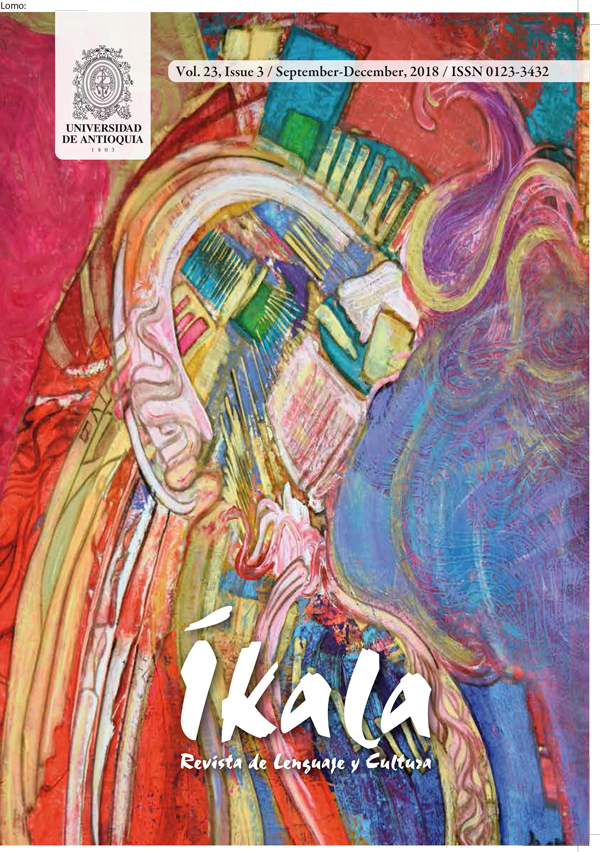The Murdered father in Colombia —Between the manly and the loving father
DOI:
https://doi.org/10.17533/udea.ikala.v23n03a02Keywords:
murdered father, confessional narration, Mi confesión, Mauricio Aranguren, No hay causa perdida, Álvaro Uribe Vélez, El olvido que seremos, Héctor Abad FaciolinceAbstract
The present article analyzes the presence of the murdered father in three texts published over the last two decades in Colombia. The texts were chosen for their testi-monial and literary characteristics, the centrality of the father’s death to each of them, and the media impact of all three killings. In each text —Mauricio Aranguren’s Mi confesión, Álvaro Uribe Velez’s No hay causa perdida and Hector Abad Faciolince’s El olvido que seremos— the image of the father is described in depth, and his death presented as a tragic event to which the son then responds. Similarities between the three fathers and the way their sons respond to their deaths are described. Three kinds of reaction are identified: bloody revenge in Mi confesión; saving the nation in No hay causa perdida, and disenchantment in El olvido que seremos
Downloads
References
Abad-Faciolince, H. (2011). El olvido que seremos. Barcelona: Seix Barral.
Aranguren, M. (2005). Mi confesión. Madrid: SEPHA.
Botero, J. (2011). La vida no es fácil, papi: Tanja Nijmeijer la holandesa de las Farc. Santafé de Bogotá: Ediciones B, Grupo Z.
Chevalier, J. (1986). Diccionario de los símbolos. Barcelona: Editorial Herder.
Cubides, F. (2006). Reseña de El olvido que seremos. Retrieved from http://fcubides.tripod.com/sitebuildercontent/sitebuilderfiles/abad-resenhacorrerevisa.pdf
Efe. (2012). Héctor Abad recibirá el “Premio Literario de Derechos Humanos.” El Espectador.
Escobar, A. (2011). Lectura sociocrítica de El olvido que seremos: de la culpa moral a la culpa ética. Estudios de Literatura Colombiana, (29), 165–195.
Freud, S. (n.d.). Obras completas [versión pdf]. Recuperado de scribd.com.
Gonzálvez Torralbo, H. (2007). Reseña de Mi confesión. Revelaciones de un criminal de guerra de Mauricio Aranguren Molina. AIBR. Revista de Antropología Iberoamericana, 2(1), 156–158.
Lefevere, A. (1992). Translation, rewriting and the manipulation of literary fame. Londres: Routledge.
Legendre, P. (1994). El crimen del cabo Lortie. Tratado sobre el padre. Madrid: Siglo Veintiuno de España Editores, S.A.
Liberman, A. (1994). La nostalgia del padre: un ensayo sobre el derrumbe de la certeza paterna. Madrid: Ediciones Temas de Hoy.
Nabokov, V. (2012). The Annotated Lolita. Londres: Penguin Modern Classics.
Palmer, J. (1983). La novela de misterio (thrillers): génesis y estructura de un género popular. México, D.F.: Fondo de Cultura Económica.
Raguet-Bouvart, C. (1996). Lolita, un royaume au-delà des mers. Bordeaux: Presses Universitaires de Bordeaux.
Silva, M. (2013). Avatares de la distinción histórica entre la escritura de la historia y la escritura de ficciones. Íkala, 18(2), 97–110.
Simpson, D. (1998). Courtly Love. The School for New Learning. Retrieved from http://condor.depaul.edu/dsimpson/tlove/courtlylove.html
Uribe Vélez, A. (2012). No hay causa perdida. Londres: Celebra.
Vallejo, V. (2008). Amando a Pablo, odiando a Escobar: la increíble historia de amor entre el narcotraficante más buscado del mundo y la estrella más famosa de Colombia. Barcelona: Debate.
Published
How to Cite
Issue
Section
License
Copyright (c) 2018 Íkala

This work is licensed under a Creative Commons Attribution-NonCommercial-ShareAlike 4.0 International License.












